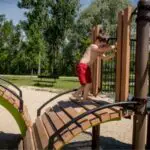Your bathroom may be a picture of bathing bliss where you can hide away for a relaxing bath when the kids are in bed, but have you thought about whether it’s safe?
You can now buy pretty much any kind of medicine over the counter and most of us have got at least some painkillers handy but if you knew that medicines result in over 5,000 Accident and Emergency cases every year, mostly to young children under 5, you might think again about leaving things where they can be easily reached.
Appealing to Children
Many medicines are in tantalizing plastic pots that make lovely rattling noises when shaken – and a lid is an invitation to a young child to open it. Bright pink liquid medicines also look like juices. Most children’s medicines are designed to taste great and we give a lot of praise when medicine is taken so naturally, children don’t see the dangers. Even if it is a vitamin tablet, eating several at once can cause harm to a young body.
And with toiletries, they see you use them on your face and body regularly and will try and imitate – but not always with the same degree of caution around the eyes or mouth.
How Can You Avoid Toddler Temptation?
Never underestimate your child! Get medicines and toiletries physically out of reach. Fit childproof locks on cupboards and drawers containing medicines. Ideally fit a lockable cabinet high on the wall and not above a cupboard that can be used to climb up to it.
Toiletries you believe do you good can be harmful to a small child if taken in large quantities. Mouthwashes, for instance, can poison a child, so where possible use alcohol-free varieties. A lot of make up products are toxic when taken internally (though they do look cute smeared over small faces!), so make sure it is kept on a shelf in a wardrobe or a locked dressing table drawer.
Buy brands which have a childproof caps or lids. However, try to make sure this is the type that requires a hard push down at the same time, as twisting it as these are the most effective. My four year old loves nothing more than tearing the plastic strips from plastic drinks bottle lids, a method often used with medicines and tablet pots. Most methods are ‘child resistant’, which is not the same as childproof, so the same measures should be taken to lock them away regardless.
Pills, pens, and other potentially fatal items that they pull from bags in hallways or beside sofas frequently injure babies and young children. You know handbags are private, but children don’t! Put yours and your guests’ belongings out of reach straight away.
What to do if the Worst Happens…
If you think your child has swallowed something they shouldn’t, ring NHS Direct or your GP straightaway. If this isn’t possible, take your child to A&E and take the packaging of the product with you if you can. If your child is unconscious, call an ambulance.




